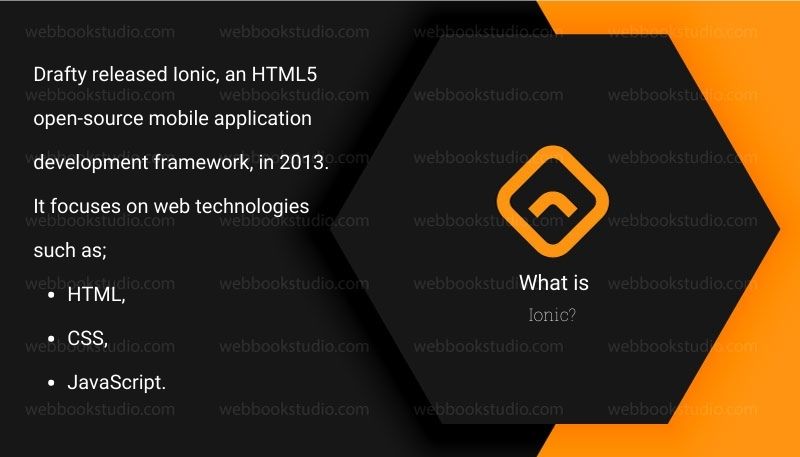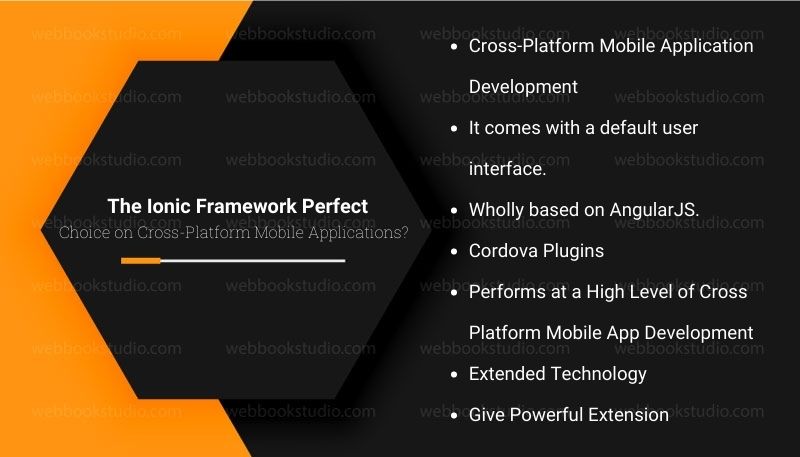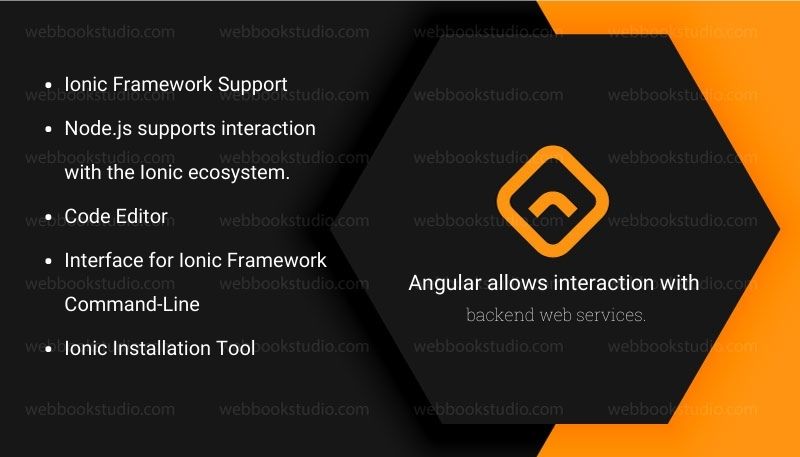Cross Platform Mobile App Ionic Framework: Your perfect Smartphone App Development Solution
The Ionic framework is proud to be a cross-platform platform solution for mobile app development. More than five million apps were created using its SDK.
Mobile app developers prefer this evolution as it favors;
- High-quality performance,
- Durable integration of APIs,
- Maximum functionality.
Every good thing has its downsides. Ionic app development is, by definition, a priority that values specificity. Cross Platform apps can only run on specific platforms.
If you want your mobile app to work on both iOS and Android, you will need two apps, two code bases, and possibly even two teams of developers.
If you decide to take this route, prepare to pay twice as much. Join the Ionic developer team supporting Company Webbook Studio.
We are a Web Design and Development Company not only in the United States but also worldwide in more Big and small Individuals and Corporate Valuable Customer Supports Wildly.
Our Expertise and Passionate team always try for Maximum Profits but are Affordable with Cost-effective Service.
Let’s look at Cross Platform App; the Ionic framework and what it can do for Business.
What Average Cost of Ionic developers in the U.S.?
ZipRecruiter and other sources indicate that the average annual salary for Senior Ionic Developers in the United States ranges between $47,500 to $157,500 per year. However, the national average is $107 768.
Brands that offer a personalized customer experience are more likely to convert and draw more people than those that don’t. Smartphone applications are a way for businesses to personalize the user experience. Cross Platform App support with Mobile applications is not just for this reason;
However, Mobile applications can bring direct business to brands by reaching a global audience. Your trouble continues beyond deciding to create a mobile app.
It begins with that decision. Mobile app development is complicated. It would help to consider who your;
- Target audiences,
- which operating system do you prefer,
- and what framework is best?
It also recommended employing ionic app developers that can answer all your questions. Most mobile app development companies prefer the Ionic app development framework for simple or complex development needs.
What is Ionic?
Drafty released Ionic, an HTML5 open-source mobile application development framework, in 2013. It focuses on web technologies such as;

- HTML,
- CSS,
- JavaScript.
The three Ionic creators are Ben Sperry, Max Lynch, and Adam Bradley.
They describe Ionic’s MIT License for commercial and personal use in a place of origin environment as the “right approach to offering a framework.”
Drifty was created to bridge the gap between cross-platform mobile development.
They have been very successful in the many years since the Ionic launch.
More than five million developers now use Ionic to create native app-like Progressive Web Apps. PWAs provide native-like app experiences via the shell of a Web App.
The first versions of Ionic were based on;
and other web technologies.
Developers can create hybrid mobile apps with these tools, meaning Ionic apps have web and mobile elements.
AngularJS, one of JavaScript’s most famous libraries – was then used in conjunction with Ionic to make mobile applications fully functional.
Apache Cordova permits the use of standard web technologies previously mentioned.
Ionic v.4 was released in January 2019. You can now use Ionic without the need to install Angular, or any other framework. Ionic works by directly manipulating web components. Alternative frameworks such as ReactJS and Vue.js are also available.
What is an Ionic Developer? What kind of Support Cross Platform Mobile App Evolution with Ionic Frame?
Cross Platform Mobile App Ionic developers are professionals who work with the Ionic skeleton. Ionic developers are mobile app designers who have chosen the Ionic SDK for particular reasons.
Ionic will attract many developers who are skilled in developing web applications. This skill set will find Ionic a natural advantage.
A decade ago, building a mobile app required you to be familiar with each platform’s native languages.
Practice with Objective C to create an iOS app. Java is required to build an Android application. Use C# to create a Windows app.
Now it’s available to help web app developers who need to become more familiar with mobile app development.
That makes it easy to do without having to learn several languages. Ionic makes web developers feel at home, even if they already have the necessary skills for web technology.
Ionic History; Cross Platform Mobile App Supports.
The Ionic platform is a huge success. Many developers have used it to create both mobile and desktop apps. It allows developers to access all the functionality and features needed for continuous delivery.
-
Ionic 1
This version was released in 2013. It is compatible with Angular 1. Angular 1 uses its directives for custom angular components. Only the angular app can run this version. This version does not require a web component.
-
Ionic 2
This version was released in 2016, with compatibility with Angular 2. It provides the same functionality and features as version 1. This version focuses on the angular component but not the web component. Only angular 2 applications can support Ionic 2.
-
Ionic 3
The 2017 version of this software was released with additional features than versions 1 and 2. Version compatible with angular 4 but also features the Ionic framework. This version cannot be used with Angular and is not recommended for future uses. Make it difficult to create native mobile apps.
-
Ionic 4
This version was released last year in 2019 for web-component-based. You can create both native mobile apps and progressive web apps with this version. It can be used with all browsers that support HTML elements.
-
Ionic 5
The material design was the main focus of this version, which was released on February 11, 2020. It has dramatically improved the user interface. This version supports multiple frameworks, allowing you to create custom animations and components. All UI components have greatly improved in this version.
What is the Ionic Framework?
An ionic framework is a place of origin user interface toolkit that allows top app developers to create high-quality web applications. The Ionic framework supports HTML, CSS, and JavaScript. That is one of the most impressive features. Developers can use it to create easily;
- buttons,
- motions,
- animations,
- and other elements.
It can be used as a standalone platform or integrated with third-party frameworks and libraries.
7 Best The Ionic Framework Perfect Choice on Cross-Platform Mobile Applications?

The Ionic Framework is open-source and supports many languages, including HTML, CSS, JavaScript, and CSS. It is a favorite framework for professionals in Ionic application innovation.
Webbook Studio Web development team looking at a few of the Ionic Framework’s benefits and why it’s used for hybrid application development.
1. Cross-Platform Mobile Application Development
Many mobiles run different operating systems. Any mobile application that we develop should work with multiple operating systems. Ionic uses the same code base developers use to create apps compatible with all mobile devices. That gives you a consistent look and feel.
2. It comes with a default user interface.
Ionic offers default CSS and JS components that enable developers to create mobile apps. You can modify the CSS classes that are already predefined to meet your needs.
3. Wholly based on AngularJS.
Angular is the preferred skeleton for developing web and mobile apps. Angular offers many HTML extensions that are useful for developers.
Combining Ionic and Angular provides many options to add attractive components to your application. Angular JS is an excellent solution to the Ionic framework.
4. Cordova Plugins
Many plugins can be developed using the ionic skeleton. The Cordova plugin allows designers to access different components.
- These components use to enhance your application.
- Developers can use these plugins in Ionic to create a mobile app.
- Those methods will help you create elegant designs.
- Developers can create simple and robust designs with the Ionic framework.
That offers many customizable themes and components that create a user interface that will attract more people to your app.
5. Performs at a High Level of Cross Platform Mobile App Development
Ionic offers a friendly environment for creating applications that can run on mobile devices. Any component adequately used to improve mobile performance.
6. Extended Technology
You can create interactive mobile apps with native experience using the Ionic skeleton. If you’re looking at enterprise applications, Ionic provides the advantages of the open internet.
7. Give Powerful Extension
Ionic supports the use of a wide range of plugins.
These plugins can make your web and mobile applications future-ready. You can include as many user-friendly functions as you like.
Why use the Ionic Skeleton?
Ionic’s sole purpose is to bridge the gap between AngularJS mobile and hybrid web applications.
To create interactive applications, you can use the Cordova library and the AngularJS features.
You can use native UI components compatible with every operating system. Ionic is now available for multi-platform development.
The IONIC platform is an excellent choice for your development.
Open-source and freely available
The Ionic frame is relatively stable, reliable, and faster. You can create cost-effective applications while still maintaining a native look and feel.
This framework is relatively easy to learn and includes many plugin support.
Wide Community
It cannot be easy to get started with a new skeleton. The ionic is supported by Cordova and Angular and has a large community that can help you solve problems.
Many members are available to assist you.
One Codebase
It will be a long process to develop native apps for iOS and Android.
Ionic will allow us to create cross-platform apps, high-end user interfaces, and reusable components. You will be able to save a lot on rewriting.
Simple Testing
Ionic simplifies mobile application testing. You can test it via browser or stimulator testing on all OS. Remote debugging and testing of apps on the virtual platform are possible.
What makes the Ionic Framework different than other mobile development platforms?
There are many hybrid platforms, but choosing the right one for your interactive app is crucial. Ionic, however, has been popularized by many startups and large companies.
There are many alternatives, including;
Although each has its features, ionic is preferred for the following reasons.
Increased speed
These cross-platform apps are always fast enough, and there’s no doubt about that. You should ensure that your mobile application is compatible with all platforms and devices if you’re developing one. The ionic framework guarantees high speed and compatibility with all modern devices. Apps can be designed to be robust and highly optimized.
Interactive User Interface
Customers are attracted to a user interface. With the ionic skeleton, businesses can now create interactive mobile apps that are high-end and user-friendly with less effort.
That has many predefined components that can easily be reused in multiple parts to increase interactivity.
You can create applications using a single command and various plugins with Ionic’s CLI.
Great Ionic-Angular Combination
Angular allows interaction with backend web services.

- Ionic Framework Support
- Node.js supports interaction with the Ionic ecosystem.
- Code Editor
- Interface for Ionic Framework Command-Line
- Ionic Installation Tool
Create an app for functionality. Feel Free Contact Us for more details.
Ionic Editors
Editors let you create code files for any language. We know that Ionic uses typescript and ES6.
Therefore, the editor must support these languages. Here is a list of the most popular editors for Ionic app development.
WebStorm
This powerful IDE supports HTML, CSS, Javascript, and many other web technologies. The IDE costs a small fee and includes many useful features to make developing easier. Webstorm supports Ionic and Angular syntax.
Atom
The Atom is an open-source, free IDE created by GitHub. It is a cross-platform, customizable source code editor.
It is customized in HTML, CSS, and Javascript. Third-party themes and packages can be installed to allow you to create custom features for your apps. Also balanced is compatible with all operating systems.
ALM
This editor is free and has a place of origin. Any system with chrome or the node will support this editor.
This IDE can host on both the server and the system, providing an internet connection. It is also simple to utilize and handle.
Webclipse Angular IDE
This place of origin IDE is beneficial for typescript and angular programming.
You can also use integrated terminal support to manage NPMs.
It also supports HTML and Angular CLI.
Ionic Development: The Pros and Cons of Cross Platform Mobile App Innovation Strategy.
Here are the benefits of the Ionic skeleton.
- It is faster than native iOS/Android apps.
- Apps can be developed within the browser.
- You can create different applications with the same codebase, except for specific plugin support.
- To get started, you need to know Angular HTML, CSS, Javascript, and Typescript.
- Many UI components include that will make it simple to use and manage.
- You can use a variety of plugins to create more interactive mobile apps.
- Create it easy to test the modules and their components.
- It offers a variety of plugins and reusable parts.
- A single codebase that allows cross-platform app development.
- Allows you to go faster for different platforms.
- You can quickly prototype with it, and you get many UI elements.
- Due to the angular and Javascript usage, it has a strong community.
Ionic has its disadvantages.
Here is a list of disadvantages you might feel when working with ionic frameworks;
- Some plugins in the system need to be more stable and consistent with one another.
- Ionic makes debugging more complicated and takes longer to solve.
- Challenging to identify the source of an error, and the message may sometimes need to clarify.
- Without any reason, the builds can crash like an original corrupted folder.
- You may have security problems when building hybrid apps.
- Your code could also be vulnerable to hackers.
- Need plugins to access native functionality if you start with an ionic skeleton.
- When building heavy and complex mobile applications that make many performance issues.
Conclusion about Cross Platform Mobile App Development with Ionic Skeleton
Ionic is a powerful technology that allows you to create modern web and mobile apps much faster than native app development methods. That allows you to learn many languages, which will help your knowledge.
Related Post: Mobile Application Development. How to start?
You can use this tool to create mobile apps that support different platforms. This tool allows developers to reduce mobile application development time, effort, and costs.
If you need help with Cost-effective and lifetime support with Webbook Studio Support, Please feel free Contact Us.
However, it can sometimes be slower and less performant than traditional development.
Ultimately, you can choose which editor and tool you use for development.
FAQ (Frequently Asked Questions) about Cross Platform Mobile App Support.
1. What is Ionic Framework? And why does Ionic Framework make sense for app developers worldwide?
Ionic is a mobile app development platform that offers developers a wealth of abilities and tools for creating their applications. From its simple design to its in-depth architecture, Ionic has something for everyone. The platform is easy to learn and use, making it an ideal choice for beginner developers or anyone looking to expand their mobile development skills.
2. How do I hire a Cross Platform Mobile App Ionic developer?
You can hire an Ionic developer by deciding which tools you use. For example, you can hire developers through Indeed or Linkedin. The trio is another option. Reddit even allows you to find developers. Ionic developers can hire on a project basis.
There are plenty of options if you are only looking for an Ionic developer to work on one project. Webbook Studio allows you to book a developer no matter the project’s length. Developers will seamlessly integrate with your existing working model.
3. How much is the cost of developing an Ionic app?
Ionic is open-source, free software. The research and development phases will cost you the most money. You will need to spend money to study the market, hire developers, and conduct focus studies.
4. What are the essential qualities to look for in an Ionic developer?
Ionic developers should have the ability to:
- Proficient in Ionic, Cordova, and Angular
- Have strong UI development skills
- Navigate both native and online technologies
- Build hybrid applications with efficient and maintainable code
- Demonstrate your experience in mobile app development.
5. Why choose this skeleton to develop mobile apps?
It is a powerful frame with a lot of flexibility, many Cordova plugins, and large community support. It also saves time and effort in the cellular application development process.

